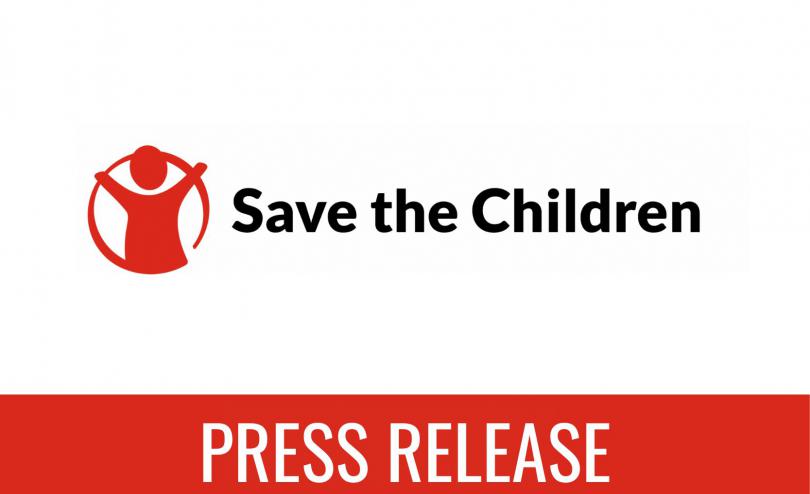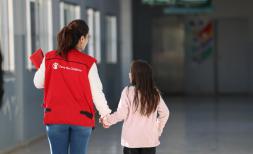UKRAINE: MORE THAN HALF OF CHILDREN MISSING OUT ON EDUCATION DUE TO BLACKOUTS - SURVEY

KYIV, 17November — One in two caregivers in Ukraine said their children’s education suffered after reoccurring attacks on power plants in October left more than 4.5 million households without electricity, according to a survey by Save the Children.
Children’s access to education is set to drastically worsen the longer the fighting continues around urban centres and heavily populated areas such as Kyiv. The continued attacks on energy infrastructure in November have left some 10 million families across the country without electricity.
Save the Children conducted an online survey of more than 1,600 caregivers across Ukraine to find out whether emergency power cuts had disrupted children’s education. Half of them reported that between October 10-21 their children missed online classes or could not do their homework due to an absence of electricity, internet connection, or because they needed to take shelter.
A mother of a school student in Ukraine who responded to the survey said:
“It’s challenging, but my kid does all the tasks herself. She has a knack for learning, but it’s tough to read, write and complete tasks via smartphone.”
It’s estimated that 2.6 million students are learning from home, as of October 22, according to the Ministry of Education and Science of Ukraine. Whilst some schools have been able to reopen since September 1, many lack protective shelters, have been damaged or destroyed, or remain under possible threat of attacks. As a result, online education is essential for children to continue their learning.
Khrystyna*, 14 years old, from Poltava said:
“I miss 3 to 4 lessons per week. The mobile network is very bad. I look through the textbooks myself and study with a tutor. There are some topics you really need someone to explain to you.”
Viktoriia*, 16 years old, from Boryspil near Kyiv added:
“In our town, the power outages are quite often. And every time they happen, I miss some lessons. Mobile internet is not always good enough to connect to online classes. I go through the material myself but it’s difficult because I really miss talking to teachers in person. Without their explanations I can’t really understand everything.”
Teachers have reported that the power blackouts are also affecting children’s motivation to learn.
Mariia*, a mathematics teacher from Kyiv region, said:
“The teachers do their best. We attach video lessons, we create presentations, we send out lessons to those who couldn’t connect to the internet. But we have a hard time, and children do as well. They lack motivation. Then, parents have to jump in, to control and to motivate. Once the electricity is back on, kids do not want to learn, they want to play. Then the blackout comes back, and no homework is done.”
In Ukraine, Save the Children is helping to rebuild damaged schools and has established a network of Digital Learning Centers to help children access education. The organization also distributes Education Kits which contain pens, colouring pencils, notepads, and educational materials, so children do not miss crucial learning.
Sonia Khush, Save the Children Country Director in Ukraine, said:
“The war has delivered a devastating blow to children’s education in Ukraine. Thousands of schools have been damaged by shelling and missile strikes, and hundreds are completely destroyed. A small number of children who are still able to attend school in person are forced to hide in shelters every other day. The power cuts and rolling blackouts are robbing the millions of children who learn online of their education. The continued fighting around urban centres will make a bad situation even worse.
“It goes without saying how crucial education is for children. Knowledge is important, but school also provides an opportunity to connect with their peers and to support one another through a very difficult time. We are at risk of a whole generation of children missing out on the learning, development and joy that education provides.
Save the Children calls on warring parties to adhere to their obligations under international humanitarian and human rights law, including those on proportionality and discrimination in the targeting and carrying out of operations, and ensure that civilians and civilian objects, especially those impacting children such as homes, schools, and hospitals, are protected from attack.
Save the Children has been operating in Ukraine since 2014, delivering humanitarian aid to children and their families. It is now supporting refugee families across Europe and helping children to access education and other critical services.
Notes
*Name has been changed to protect the identity.
The survey was conducted via social media from 20-31 of October. Save the Children surveyed 1604 parents of children, who learn at schools, colleges, higher educational establishments, technical schools, specialised schools, and boarding schools.
Throughout October, there were five waves of attacks on power plants across Ukraine, that took out an estimated 40% of energy infrastructure in the country, according to the Ukrainian government. To stabilize the energy system and reduce the consumption of electricity, the authorities have introduced rolling blackouts. Scheduled power cuts hit 7 to 10 regions in the Northern, Central and Eastern parts of Ukraine every day, with outages lasting up to 12 hours in total.
***********************************************************************************************
For further enquiries please contact:
Ruby Wright, Ruby.Wright@savethechildren.org (works Wednesday and Thursday)
Sam Halyk, samantha.halyk@savethechildren.org
Our media out of hours (BST) contact is media@savethechildren.org.uk / +44(0)7831 650409
Please also check our Twitter account @Save_GlobalNews for news alerts, quotes, statements and location Vlogs.
We have spokespeople available in Ukraine and countries hosting Ukrainian refugees where Save the Children works.




